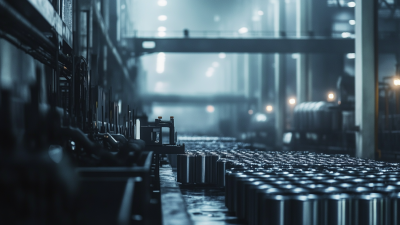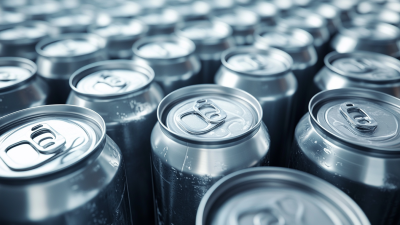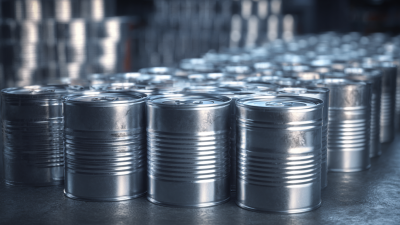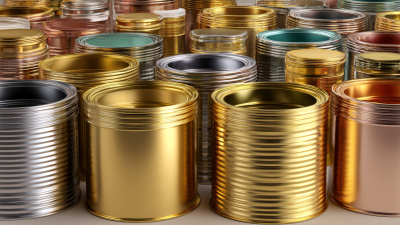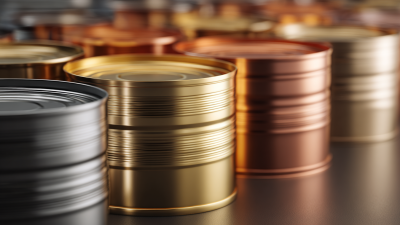 +8618680445103
+8618680445103
Free Standard Samples can be provided for you to check the quality.
Leave Your Message
 The significance of the metal can in packaging solutions cannot be understated, as it plays a crucial role in preserving product quality and enhancing shelf life. According to a report from the Environmental Protection Agency, metal cans are among the most recycled packaging materials, with an impressive recycling rate of 69% in the U.S. alone, showcasing their sustainability and environmental benefits. Furthermore, a study by the Metal Packaging Manufacturers Association highlights that metal cans provide an impermeable barrier to light, air, and moisture, ensuring that food and beverages maintain their freshness and flavor for extended periods. As markets increasingly focus on sustainable packaging options, the metal can continues to demonstrate its multifaceted advantages, including durability, cost-effectiveness, and the ability to be recycled indefinitely without loss of quality, making it a prominent choice for various industries.
The significance of the metal can in packaging solutions cannot be understated, as it plays a crucial role in preserving product quality and enhancing shelf life. According to a report from the Environmental Protection Agency, metal cans are among the most recycled packaging materials, with an impressive recycling rate of 69% in the U.S. alone, showcasing their sustainability and environmental benefits. Furthermore, a study by the Metal Packaging Manufacturers Association highlights that metal cans provide an impermeable barrier to light, air, and moisture, ensuring that food and beverages maintain their freshness and flavor for extended periods. As markets increasingly focus on sustainable packaging options, the metal can continues to demonstrate its multifaceted advantages, including durability, cost-effectiveness, and the ability to be recycled indefinitely without loss of quality, making it a prominent choice for various industries.
In today’s world, the push for sustainable packaging solutions has become increasingly important, and metal cans are leading the charge. One of the key benefits of metal cans is their recyclability. Unlike many other packaging materials, aluminum and steel can be recycled indefinitely without losing their quality or structural integrity. This means that metal cans can contribute significantly to a circular economy, minimizing waste and reducing the need for new raw materials. The recycling process for metals not only conserves energy but also decreases greenhouse gas emissions, making metal cans a responsible choice for environmentally conscious consumers.
Additionally, metal cans provide exceptional preservation qualities, which is crucial in sustainable packaging. Their airtight seal protects the contents from light, air, and contaminants, enhancing shelf life and reducing food waste. This is especially important in the food and beverage industry, where spoilage can lead to significant losses. The durability of metal cans also allows them to be shipped and transported without the risk of breakage, further reducing waste and ensuring the products reach consumers in optimal condition. Therefore, metal cans not only satisfy immediate packaging needs but also align with broader environmental goals, highlighting their importance in sustainable packaging solutions.
Metal cans have emerged as a vital component in packaging solutions, owing to their versatility across various industries. According to a recent report by Smithers Pira, the global metal can market is projected to reach over $27 billion by 2024, driven by the growing demand in sectors like food and beverages, personal care, and pharmaceuticals. For instance, in the beverage industry, aluminum cans account for nearly 75% of the market share, a testament to their lightweight, recyclable nature and ability to maintain product freshness.
One noteworthy feature of metal cans is their compatibility with different product types. They not only serve as effective barriers against oxygen, light, and moisture, but also support a range of applications from carbonated drinks to skincare products. In personal care, the use of metal cans for sprays and lotions has increased, as these packaging solutions provide a sleek aesthetic while ensuring product stability.
Tip: When selecting packaging solutions, consider the environmental impact. Metal cans are 100% recyclable, which contributes to a circular economy. Ensuring your packaging is eco-friendly not only attracts conscientious consumers but also enhances your brand’s reputation in a competitive market.
Metal cans play a critical role in ensuring the longevity and safety of packaged products. According to a report by the National Institute of Health, metal cans can extend the shelf life of food products by 2 to 5 years, effectively reducing food waste and enhancing food safety. This is largely due to their airtight sealing capabilities, which prevent contamination from bacteria and spoilage over time. Additionally, metal is resistant to light and moisture, further protecting the contents inside from degradation.
Tip: When choosing metal can packaging, consider the coating materials used, as they can significantly impact the product's integrity and safety. Look for cans with food-safe linings that prevent chemical leaching and preserve flavor.
Moreover, the recycling potential of metal cans also contributes to sustainable packaging solutions. According to the Aluminum Association, 75% of all aluminum ever produced is still in use today, highlighting the environmental benefits of using metal cans. Their recyclability not only helps reduce waste but also cuts down on energy consumption during production processes.
Tip: Always check for recycling symbols and guidelines on metal packaging, as recycling can further enhance the environmental benefits associated with using metal cans for packaging.

Metal cans play a critical role in packaging solutions, especially when it comes to cost-effectiveness in manufacturing and distribution. The streamlined production process allows for efficient use of materials, which significantly reduces manufacturing costs. Furthermore, metal cans are highly durable and provide excellent protection for various products, ensuring that goods remain intact during transport. This durability directly translates to lower distribution costs, as there are fewer instances of damage and spoilage.
Tip: When selecting packaging solutions, consider the life cycle cost of the materials used. Metal cans, while potentially more expensive upfront than some alternatives, can lead to significant savings in the long run due to their low waste and recyclability.
The growing market for stand-up pouches reflects a broader trend toward versatile packaging options. However, metal cans remain a strong contender due to their long shelf life, which is essential for products like food and beverages. Their recyclability also appeals to environmentally conscious consumers, aligning with current sustainability trends in packaging.
Tip: To maximize efficiency, businesses should assess their supply chain processes. The use of metal cans can streamline logistics, potentially reducing overall operational costs over time. Investing in research to understand the best packaging solution for your product can yield substantial financial benefits.

In recent years, metal can designs have undergone significant innovations to meet the evolving demands of modern consumers. Today, consumers are not just looking for functionality in packaging; they also seek aesthetic appeal, sustainability, and convenience. Manufacturers are responding by introducing features like easy-open tabs, resealable lids, and vibrant artwork that reflects consumers' lifestyles and preferences. These advancements enhance the user experience while maintaining the robust protective qualities that metal cans offer.
Additionally, sustainability has become a crucial aspect of packaging innovations. Many companies are now focusing on producing cans with recyclable materials and minimizing their environmental impact. This shift not only appeals to eco-conscious consumers but also positions metal cans as a responsible choice in the packaging industry. Innovations such as lightweight designs and the use of post-consumer recycled aluminum are making metal cans more appealing while meeting the sustainability criteria that consumers care about. As these trends continue to shape the packaging landscape, metal cans will likely remain a favored choice among both consumers and manufacturers.
| Dimension | Description | Consumer Demand | Innovation Feature |
|---|---|---|---|
| Material Type | Aluminum and Steel | Sustainability | Recyclability Features |
| Seal Technology | Vacuum Sealing | Longer Shelf Life | Enhanced Freshness |
| Size Variability | Various Sizes Available | Customization Needs | Adapting to Consumer Preferences |
| Graphics & Design | High-Quality Printing | Attractiveness | Interactive Packaging |
| Storage Efficiency | Stackable Design | Space Optimization | Efficient Shelf Placement |
